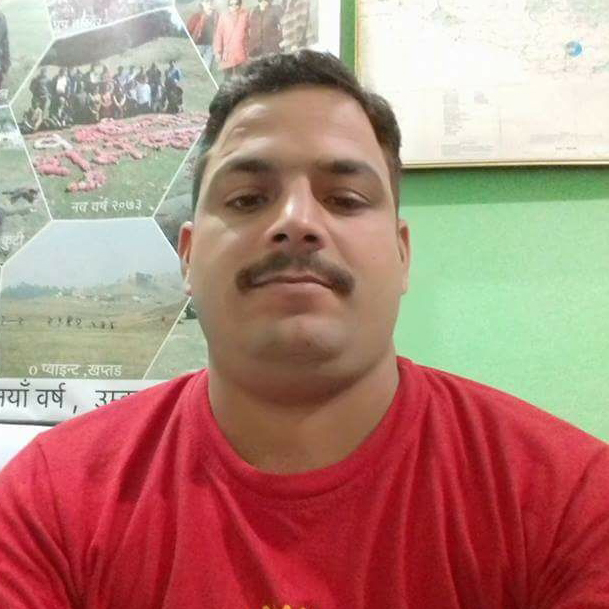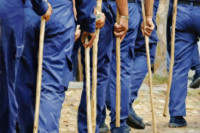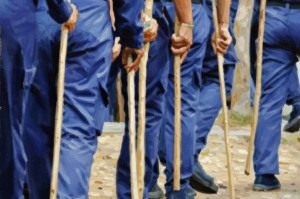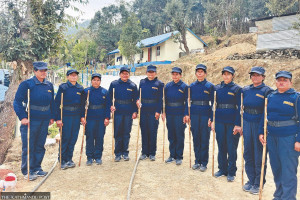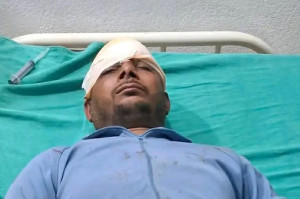Sudurpaschim Province
In farwest Nepal, even elected officials bow to outlawed Chhaupadi tradition
The punishing custom of banishing menstruating women to isolation sheds continues due to superstition, fear and social pressure.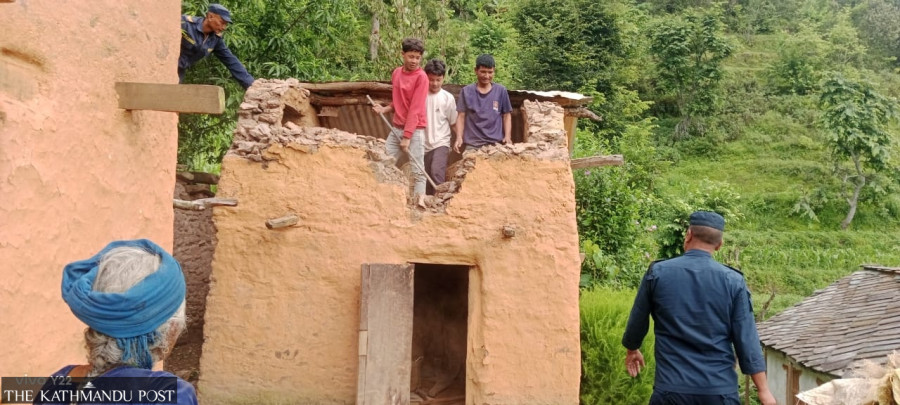
Menuka Dhungana & Bhawani Bhatta
Despite years of activism and legal restriction, the deeply-rooted Chhaupadi tradition—where menstruating women and postpartum mothers are exiled to makeshift sheds considering them impure—still persists in various districts of Sudurpaschim and Karnali provinces. Alarmingly, even the elected people’s representatives in the local government, tasked with abolishing such discriminatory practices, continue to observe the punishing custom.
Ramana Shahi is a ward member of ward 8 of Panchadewal Binayak Municipality in Achham, a hill district of Sudurpaschim. She finds herself trapped between social progress and superstition. Before she was elected in 2022 as a Nepali Congress candidate, Shahi served as the leader of a local mother’s group. In 2019, she led campaigns to demolish more than 200 menstrual sheds in her village, aiming to liberate women from unsafe and humiliating menstrual exile. Yet, after initial success, the age-old practice crept back in. Shahi herself now spends her monthly periods in a rebuilt Chhaugoth (menstrual shed) next to her house.
“I was at the forefront of the campaign. But once the movement stopped, everyone reverted. I couldn’t stand against the community either,” said Shahi. Fear of angering local deities, especially Kuikelni Mai—believed to manifest wrath upon defiance—keeps even educated women like Shahi bound to the outlawed custom.
Shahi’s plight is echoed by ward member Basanti Saud of ward 6 of Chaurpati Rural Municipality, Achham. Widowed young, Saud lives in Selpakha village, where every household practices Chhaupadi. Despite her political position, she is yet to muster the courage to defy tradition.
“No one dares stay at home during periods due to fear of divine punishment. Without collective rejection of the custom, even speaking against it risks social boycott,” said Saud who was elected from the CPN-UML.
Police confirm the widespread presence of Chhaugoth, even in the homes of elected representatives at the local level. Deputy Superintendent of Police in Achham Ishwari Prasad Bhandari, who oversees community-police partnership programmes, says their outreach campaigns have failed to shift entrenched mindsets.
“More than 190 awareness events were organised in all 10 local units in Achham over the past one year, but representatives themselves practice Chhaupadi. Without their leadership, eradication of such deeply-seated practice remains elusive,” argued Bhandari. “Most of the people say that they no longer stay in Chhaugoth. But in reality, they are still following the practice.”
Municipal authorities admit frustration at the reluctance of community leaders to embrace change. According to Ambika Chalaune, mayor of Panchadewal Binayak Municipality, even the educated and influential locals resist the complete abolition of Chhaupadi practice. “It’s the state’s duty to fight Chhaupadi, but societal leaders must also participate. This is not just a women’s issue, it’s a human rights concern,” said Chalaune.
Even fellow representatives enforcing anti-Chhaupadi initiatives face backlash. Netrakala Shahi, vice-chairperson of Dhakari Rural Municipality in Achham, recalled villagers using tarpaulins and bamboo baskets after their sheds were demolished. “I couldn’t enforce penalties because the community, including political structures, remains united against change,” she said. “When local women defend the tradition in the name of culture, one woman’s voice becomes powerless.”
The chhaugoth of Uma Budha, the chief of ward 1 of Dhakari, was torn down by police just last week. “Women from nearby villages used to come to my shed because it was cleaner. With the shed gone, we now plan to expand the campaign across the village,” said Budha.
The tragedy of Kamala Auji Damai, aged 32, of ward 1 of Krishnapur Municipality in Kanchanpur district reignited the debate. She died of snakebite while staying in Chhaupadi shed in Nigali settlement on July 11. Kamala, banished during menstruation, chose to stay at her relative Asmita Damai’s shed, which seemed safer. But even that could not protect her. “She came saying her shed leaked, so I let her sleep in mine,” Asmita said, recalling the horror that followed.
The fatality triggered immediate action. Krishna Municipality issued a 15-day deadline to dismantle all Chhaupadi sheds, threatening fines of up to Rs10,000 for non-compliance. The District Administration Office in Kanchanpur also dispatched directives to demolish Chhaupadi sheds in all nine local units.
Mohan Basnet, chairman of ward 1 of Krishnapur Municipality, reported at least eight sheds had already been demolished in Nigali alone. “Most families voluntarily destroyed their sheds after Kamala’s death,” he said.
Local women remain caught in a dilemma. “We destroyed the shed, but our fears remain,” admitted Asmita, whose newly built concrete home sits adjacent to where her shed once stood. “We’ve changed walls but not our minds.”
Others share similar fears. Kamala’s sister-in-law Rupa, just back from India, recalled how she freely stayed inside the house while abroad. “But here, we can’t imagine doing so,” she said.
Concerns are surfacing on social media, too, with locals asking who would be accountable if snakebites occur inside homes. “Chhau goth demolition alone won’t solve the problem,” said local resident Suchitra Shah. “It must be paired with robust awareness campaigns.”
Officials acknowledge the challenge. “People build new houses but erect sheds next door out of fear,” Basnet said. “With 200 sheds still standing in Nigali, we plan to expand campaigns, but real victory will come only after changing attitudes.”
Chhaupadi is a deeply rooted social tradition in western Nepal which forces menstruating women to stay away from their homes—typically in sheds, cattle sheds, or separate huts—during their periods, considering them ‘impure’. The practice is most prevalent in Sudurpaschim Province, where social stigma and superstition persist despite legal bans.
Chhaupadi was criminalised in 2017, and offenders face up to three months in jail, a fine of Rs3,000, or both. However, enforcement remains weak.
Experts and rights activists stress that the battle against Chhaupadi is quite challenging. While tragic deaths bring temporary focus, long-term solutions require community-wide behavioral shifts, stronger enforcement and empowering women to stand against evil practice.




 23.27°C Kathmandu
23.27°C Kathmandu
